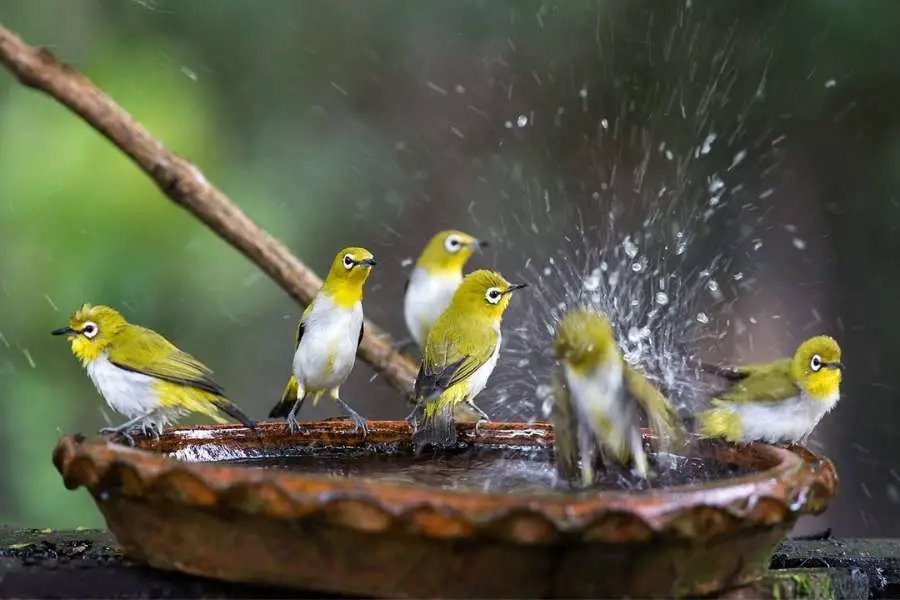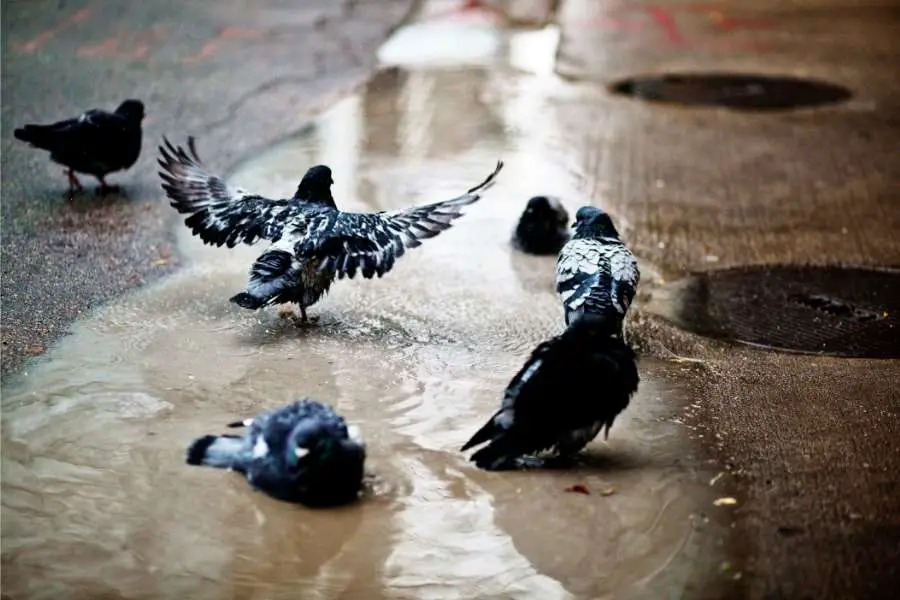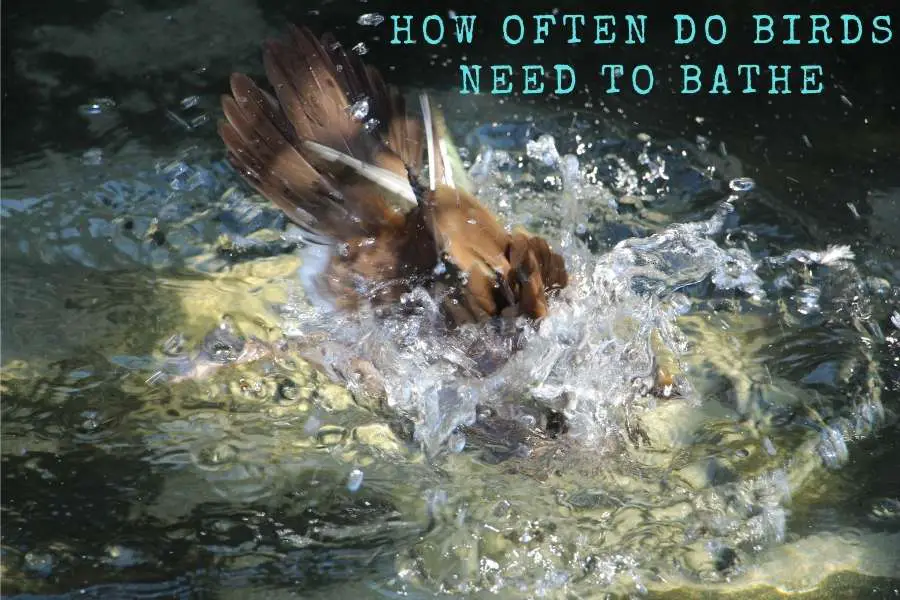Are you new to pet birds and wondering how often do birds need to bathe? Well, your quest for answers on this particular topic should begin by acknowledging that no two birds are the same.
Consequently, there is no quick answer to the question of how often birds need to bathe. Even two birds of the same species may exhibit different characteristics regarding their grooming habits. One bird may have an affinity for taking baths and enjoys playing in the water. On the other hand, some birds loathe taking baths, even though they would experience bathing almost every day in the wild.
The best answer to how often birds need to bathe is that it depends. Some birds will get along well with weekly baths, while others need baths once or twice a month.
For most bird pets, though, you should give them as many bathing opportunities as possible every three days. However, you should also consider your bird’s bathing habits, species, eating habits (are they messy eaters), and grooming habits to determine the frequency of bathing. Do not over-bath your pet, as it might cause excessive skin and feather dryness.

Why Do Birds Take Baths
Bathing is an essential part of bird behavior and practices. Whether it’s a wild bird or a caged bird, damping the feather helps to loosen any dirt attaching to the feathers and makes preening a lot easier.
Additionally, in the wild taking bathes helps birds maintain their feathers, which, in turn, enhances the bird’s flight performance. While we might not fully grasp the importance of bathing for birds, we know it’s crucial for a bird’s wellbeing.
You Can Also Learn Why Your Bird Is Shivering After Bathe
How Often Do Birds Need To Bathe? Considerations To Make When Answering This Question
Like any other aspect of pet care, there is no straight answer to this question. However, bird owners should note that bathing your bird infrequently might cause the feather dust to cake up, causing inescapable discomfort.
Some birds will result in feather plucking to get relief, which is not an effective or desired remedy to such situations. Feather plucking, in turn, results in open wounds and/or bald patches.
With the above in mind, we’ll delve into some considerations you should make when determining how often to bathe your pet bird. Keeping these considerations in mind will do you and your lovely bird a world of good.
Let’s look at the considerations that determine how often your bird needs to bathe in in-depth details.
Also Learn How Often Birds Need A Dirt Bath Here
1. The Birds Individual Preferences
Many birds love bathing daily, while others bathe only once in a while. Nonetheless, you should provide your bird with bathing opportunities regularly. Whether your bird takes up the opportunity and bathes every day or chooses to bathe once in a while depends on the individual bird.
When your bird is new to your home, begin by giving your bird an opportunity to wash once or twice a week. Over time, you may find that your bird prefers bathing at certain times of the day.
You can use the knowledge of your bird’s preferred bathing time to build a routine and help your bird stay clean.
At the time of day when your bird prefers to bathe, try to offer a bath or bring it into the shower. If it chooses to bathe, you should let the bird shower. Otherwise, try another day.
Obviously, your bird will not bathe every day, even when offered a bathing opportunity every day. Birds have a natural intuition of when they should bathe and will generally bathe when necessary. Many bird owners feel compelled to bathe their pets daily, but a daily bath isn’t compulsory.
In fact, bathing your bird too frequently can cause their skin to dry out, causing other health issues. Birds secrete a natural powder or oil that protects skin and feathers from damage. Too high a bathing frequency will deplete the skin and feathers of this natural coat of protective oil, causing dryness.
2. Bird Species
Tropical birds are naturally acclimated and adapted to higher humidity and more bathing events. Tropical rainforests are characterized by daily showers to some extent. Birds that originate from these environments and ecosystems are adapted to taking more baths than other bird species.
Giving frequent bathing opportunities to birds like the Scarlet Macaw, the Great Green Macaw, Blue and Yellow Macaw, Mealy Parrot, and Military Macaw will enhance their feather and skin health while improving their overall happiness.
3. The Air Quality In Your Home
Although it might not seem like it, the air in your house is pretty different from what most pet birds are adapted to in the wild.
The air conditioning and central heating that we run in our homes to keep indoor conditions to our liking do not automatically condition the indoor air to the bird’s liking.
For instance, most central heating and air conditioning systems make the indoor air dry, which is not conducive for the bird’s skin and feathers.
If your home has extremely dry indoor air, you should consider encouraging your bird to bathe as often as possible.
4. Prevailing Weather
During cold weather, some birds prefer to bathe less often. The cold weather is not conducive to bathing, making some birds opt for staying longer without bathing. Additionally, the cold provides less-than-optimal conditions for birds to dry their feathers well after a wash, making them a tad afraid of bathing often.
5. Your Bird’s Age
The age of your pet bird will also influence how often you should bathe your pet. Ideally, when teaching your bird to bathe, you should start slow. As such, start by offering a bath to your baby bird once a week or once every other week.
Even when the bird seems to enjoy bathing, you should start slow. The goal is to make bathing an enjoyable experience for your bird and not a torturous event. With time, your bird can grow into its preferred bathing routine, after which you can offer bathing opportunities more often.
6. Your Bird Preening Habits
All birds have their individual preening habits. Some birds are keener on self-cleaning and will prune themselves whenever needed. Other birds are laxer in taking care of themselves and will need more of your help to stay clean and healthy.
For birds that tidy themselves a lot, bathing once every two weeks will suffice. Conversely, birds that do minimal preening might need a bath or other types of cleaning once every week, especially if they’re particularly messy eaters.

Signs Your Bird Needs A Bath More Often Or An Immediate Bath
Your bird may want to bathe outside of its bathing schedule. Changing circumstances may force your bird to seek a bath, even when it’s not the usual time to take a bath. It might be it seeking to take a bath for relief, which is fine.
With that in mind, you should offer a bath immediately you notice the following signs:
Your Bird Bathing In The Drinking Bowl
When a bird feels like taking a bath, it will use any liquid in its surrounding, including its drinking water. If you notice your bird dipping its head in its drinking water or lying on it, it might want to take a bath immediately.
In the same light, if you notice this behavior repeatedly, consider increasing the number of bathing opportunities you offer to your pet.
When Your Bird Is Molting
Among birds, the molting process is essential to keep the bird’s plumage in tip-top condition. During molting, a bird renews its plumage by shedding old feathers to make way for new feathers.
As the new feathers push through the skin, they are coved in keratin, which sometimes needs softening to allow the feathers to release and unravel. Bathing your bird more frequently during the molting process might help ease and hasten the process, and soothe itchy skin.
Depending on the bird species and size, birds molt once every year or two years. Molting lasts different periods for different bird species. For instance, for parakeets, molting lasts between 2 and 3 weeks. For parrots, the process lasts much longer up to 2 months. During the molting process, you might have to offer baths more frequently.
When Your Smell Due Spending Some Time At The Bottom Of Its Cage
When your bird spends some time at the bottom of the cage, its feathers are bound to come in touch with poop. This will make your bird smelly and expose it to a myriad of pathogens as well.
With this in mind, if your bird has a habit of spending some time at the bottom of the cage, it might need extra cleaning to stay healthy.
With all the above considerations, you can form a bathing routine that suits the bird. Additionally, aside from forming and following a routine, if you notice that your bird wants to take a bath or needs one, you should offer a bath.
Importantly, always make the bathing experience an enjoyable experience, right from when you start to acclimatize to bating. Otherwise, you might have some difficulties in getting your bird to bathe.

